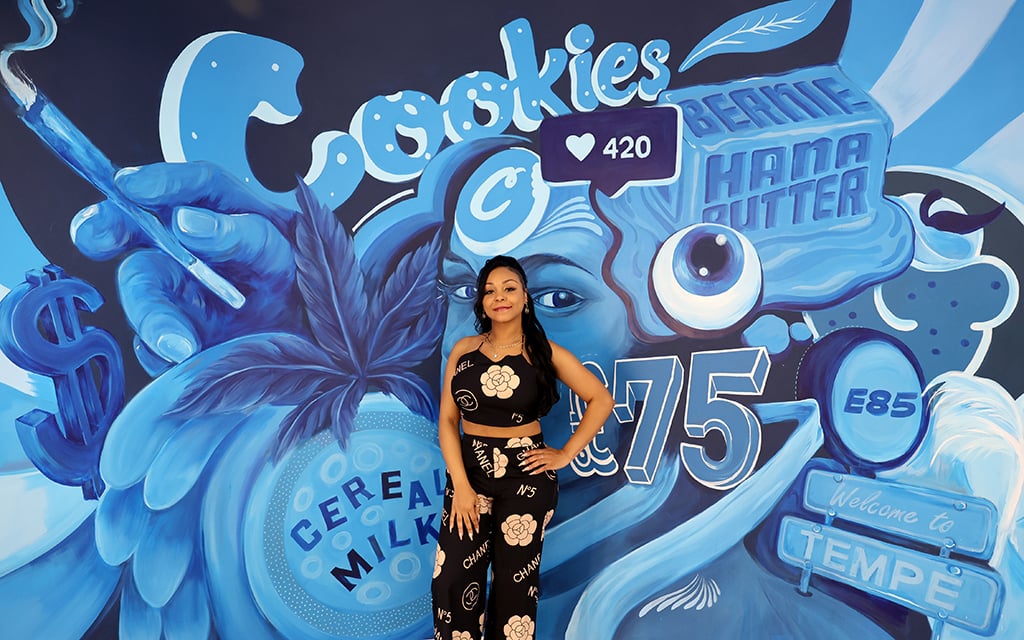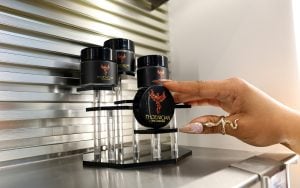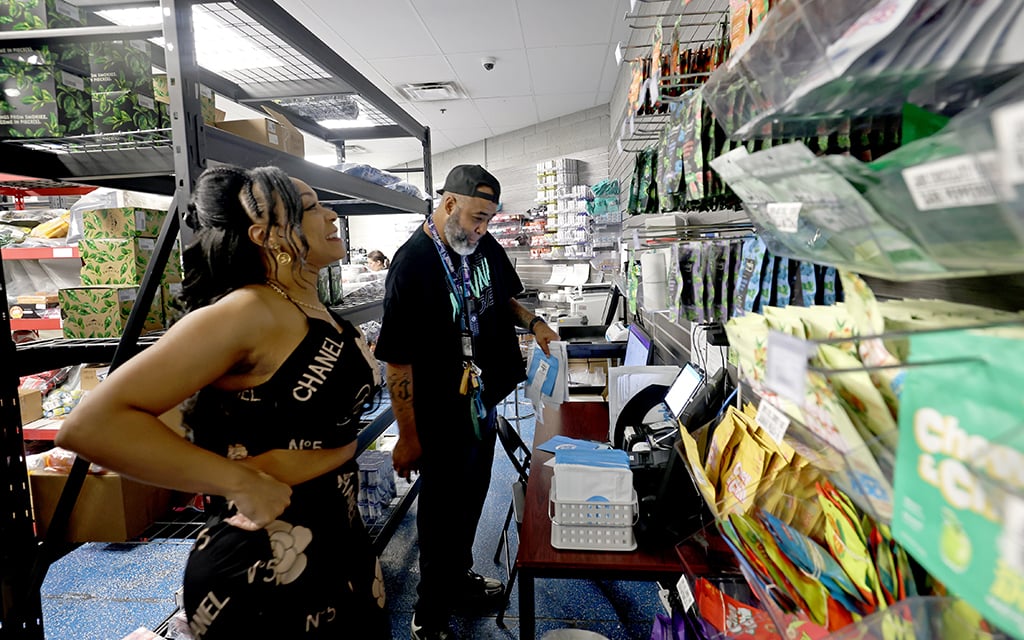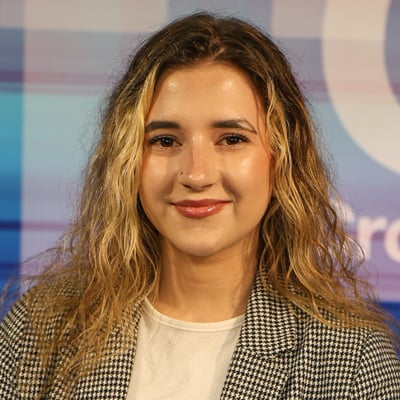PHOENIX – It might feel like there’s a dispensary on nearly every other corner. Billboards that tout marijuana products such as carts and eighths and promote specials such as “dope deals” or “BOGO” sales line Arizona freeways.
Consumers might have trouble distinguishing between the stores and the products they sell, but one major difference sets apart Cookies dispensary in Tempe.
After Cookies opened last June, owner Alicia Deals became one of the few remaining social equity license holders to successfully open a dispensary and retain 100% equity. She also became one of the only Black women to own and operate a dispensary in Arizona, according to the Phoenix New Times and the Arizona Center for Investigative Reporting.
“We went for it,” Deals said. “And we won, and we won in the most grandest fashion.”
Deal’s story is unique because most of the other social equity license winners sold them to corporate dispensaries and/or private investors, according to the Arizona Center for Investigative Reporting.

Alicia Deals poses for a portrait inside the Cookies dispensary she owns, on June 3, 2024, in Tempe. Deals is a social equity license holder and retains 100% equity in her business. (Photo by Stella Subasic/Cronkite News)
The program’s goal: promote marijuana businesses owned and operated by individuals from communities disproportionately impacted by the war on drugs.
Although the state once touted its social equity program as a national model, marijuana industry experts say this isn’t the outcome Arizona voters wanted when they approved recreational cannabis in 2020.
With the passing of Proposition 207, the state established a Social Equity Ownership Program within the Arizona Department of Health Services, which oversees recreational and medical marijuana licensing. The department held a lottery for 26 of these social equity dispensary licenses in 2022.
With the licenses awarded, the department deemed that its one-time allocation satisfied the language in the proposition, even going as far as claiming it set the standard for other social equity programs in the country, according to ADHS Interim Director Don Herrington. However, critics of the lottery say allocating 26 licenses – out of about 170 marijuana establishments statewide – wasn’t nearly enough to be considered socially equitable.
“I would argue that the social equity licensing programs that exist in cannabis have done the exact opposite of what needed to be done,” said Demitri Downing, founder and president of the Marijuana Industry Trade Association.
Health department officials said they were tasked with administering the lottery, and they did so with “integrity and in full accordance with the law,” according to an email from a spokesperson.
In terms of what happened after the lottery, the department “does not have legal standing to intervene in the sale of a dispensary.”
A Senate bill attempting to address issues with the social equity program – including enforcement against “predatory” agreements – failed to advance in the Legislature this year.
Here’s the history of the social equity program in Arizona.
Arizona’s history legalizing marijuana
Voters approved Arizona Proposition 203, also known as the “Arizona Medical Marijuana Act,” in 2010.
The program generated nearly $8 million in revenue within the first year of operation, according to the University of Arizona College of Public Health’s First Annual Medical Marijuana Report.
Voters legalized recreational marijuana through Prop. 207, also known as the “Smart and Safe Arizona Act,” in 2020. Included in the proposition, a section established that the state was supposed to use $2 million from the medical marijuana program to establish a social ownership program.
The health department established a lottery for 26 social equity licenses. Applicants had to meet three out of four prerequisites. Among the criteria: earn an annual income less than 400% of the federal poverty level, be affected by the enforcement of previous marijuana laws or related to someone who had, or live in a ZIP code that experienced a disproportionate effect from previous marijuana law enforcement.
When the state released the initial rules, critics and cannabis lawyers asked for amendments – but their attempts were unsuccessful.
The Arizona Cannabis Bar Association frequently deals with regulation, application, cultivation and zoning issues. Gary Smith, the president and co-founding director, said the state gave too few parameters and didn’t invest a lot of energy into establishing a well-defined social equity program.
“They really could’ve done a myriad of different things,” Smith said. “But they’re a health agency, they’re not a social do-good agency. They were not well suited for it.”
Smith pointed out the immediate problems: License holders aren’t required to keep their licenses, and the licenses – which could be worth millions – went to economically disadvantaged people.
“You basically said the only people qualified for the social equity licenses are people who are almost guaranteed to fail,” Smith said. “So resultantly, small surprise – not really – most of these license winners made a good decision for themselves and sold those licenses to people or companies that were more capable and able to actually operate.”
Smith said only a handful of the original 26 license holders kept ownership of their license or didn’t partner with management services organizations to open their dispensary.
These entities sometimes seek out winners to provide funding – typically with larger multi-state corporate marijuana dispensaries – and began to buy out many of the license holders.
These organizations include some familiar names: Copperstate Farms, Mohave Cannabis Co. and Mint Cannabis. All three companies have multiple dispensaries throughout Arizona and set up partnerships with social equity licensees, according to an article from Tucson Weekly.
“No one else made it, to say it plainly,” Cookies owner Deals said. “And a lot of people, even from the beginning, didn’t really have a chance.”
Deals said some of the larger organizations bought out the license winners and took advantage of them.
Alicia Deals’ journey

Alicia Deals poses for a portrait against the Cookies dispensary mural on June 3, 2024, in Tempe. Deals is one of the only Black women to own and operate a dispensary in Arizona. (Photo by Stella Subasic/Cronkite News)
Before opening her dispensary, Deals did not have a professional cannabis background. In fact, she was going to school for a bachelor’s degree in nursing science when she said “life happened” and the opportunity presented itself.
In 2012, her father, Robert Deals, was sentenced to 18 years in prison for marijuana-related offenses, according to the Phoenix New Times. Deals said that though his arrest was her family’s biggest burden, it ultimately led to their biggest blessing.
Fast forward 11 years, Alicia Deals heard about the social equity ownership program and its qualifications. She said it was scary enough to invest thousands of dollars to pay for the lottery application fee, let alone a business coming out of the worst of the COVID-19 pandemic.
“But I told my dad, ‘You know, it’s a gamble for them, it’s a guarantee for us.’ That we deserve it,” Deals said. “You know, and if not us, then who? And if not now, then when?”
Partnering with the cannabis brand Nirvana Center Dispensaries, Deals said she retains 100% equity in her business.
Despite winning the lottery, she faced adversities opening Cookies. She said she only had 18 months to find a facility, work through highly regulated operations and obtain the right zoning.
But Deals prevailed, and the business has garnered 4.5 stars from more than 3,000 reviews on Google as of March.
The cost of social inequity
The state cannabis industry was estimated to generate over $595 million in 2023 and is projected to make up to $1.7 billion by 2030 in both recreational and medicinal marijuana, according to a market research report from business consulting firm Grand View Research.
But while corporations cash out on a booming business, the Arizona prison population tells a different story.
Prop. 207 was supposed to help address decades-long inequities, especially those associated with the war on drugs. The measure included allocating $4 million to nonprofit organizations geared toward the expungement of marijuana-related offenses from criminal records.
A 2018 report from FWD.us found Black people made up 16% of prison admissions for marijuana possession in Arizona while Hispanic people made up 58%, according to the bipartisan political organization, which advocates for reducing incarceration through reforms.
However, Black and Hispanic people only make up 5% and 32% respectively of the overall state population, according to the U.S. Census Bureau.
And a 2013 American Civil Liberties Union report found that white people use cannabis at roughly the same rate as Black people. The report credited the disparity in arrests to over policing in low-income communities and racial disparities in policies and practices.
Arizona-based civil litigation and cannabis lawyer Jimmy Cool explained how old laws on marijuana enforcement have had long-term and wide-reaching effects on the communities they disproportionately targeted.
“We went out, we arrested disproportionately 80% Black men to white men for using marijuana, but we know Black men use marijuana at the same rate as white men,” Cool said. “Well then, that means that in Black communities we took fathers, we took brothers out of those communities. We took away their revenue and their income. We drove down the property values because of the crime rates.”
Cool said this led to less social mobility in communities where minorities were the majority, and these social equity “lottery tickets” did not actually provide a substantial uplift to these communities in a meaningful way. Cool said ADHS should have put safeguards in place to ensure only qualified applicants got to keep the licenses.
Lawsuits, lottery licensing and legislative setbacks
Cool recounted his start in cannabis law in 2011 with the legalization of medicinal use. His first successful cannabis lawsuit was as part of a legal team that challenged Arizona’s medicinal regulations. Cool has represented a number of dispensaries since.

Phoenician Fine Cannabis is a marijuana brand by Alicia Deals at the Cookies dispensary in Tempe on June 3, 2024. She created the brand in honor of her father, Robert Deals, who was sentenced to 18 years in prison for marijuana-related offenses. (Photo by Stella Subasic/Cronkite News)
After the department released the draft rules for the social equity lottery, Cool joined others in court to speak up about the flaws in the program.
“I guess what’s frustrating about this program is that I don’t think you were ever going to create a perfect social equity program,” Cool said. “No matter what you create, there would be some constituency that wasn’t adequately served, some unforeseen externality or consequence.”
Cool served on the legal counsel for several prominent Arizona marijuana cases, including Acre 41 v. State of Arizona, which addressed the state’s lackluster social equity lottery requirements.
The suit was dismissed. Cool said without regulations prohibiting the sale or transfer of the social equity licenses, many holders either sold their multi-million dollar asset to corporate dispensaries for a few hundred thousand dollars, or they entered into unfair and predatory management partnerships.
“We were all sitting there saying, ‘Hey, guys, look at what’s happening already,’” Cool said. “We can see the agreements that are in place already. We can see that certain people have submitted 200 applications.”
Cool said he warned people the system wouldn’t work, “and no one cared.”
Scaling the social equity wall
The Minority Cannabis Business Association’s 2022 National Cannabis Equity Report rated the 15 social equity programs across the country – of 36 states that had legalized medicinal or recreational marijuana at the time – as all inequitable based on the organization’s “pillars of equity.” Now 46 states have some form of legalized pot.
The group evaluated whether the states have established an inclusive industry, empowered communities impacted by past policies, promoted equitable justice and made cannabis products more accessible to more vulnerable communities.
Cool said Arizona should have required dispensaries to hire a percentage of staff who also met social equity criteria, ensured only qualifying applicants could own the licenses and made the owners set up stores in the communities where they live.
“You’re going to send these people back to their communities, they’re going to spend money at the local store, they’re gonna contribute to the property tax base, they are going to enrich their community,” Cool said. “It creates economic activity in these areas that we hollowed out.”
Cool said the social equity program set up license holders to fail. Problems ranged from zoning challenges, unrealistic time constraints and, since cannabis isn’t federally legal, the inability to obtain bank loans to cover the cost of operation.
What’s happening now

Inside the Cookies marijuana dispensary in Tempe on June 3, 2024. The dispensary opened almost a year ago, and the business has garnered 4.5 stars from more than 3,000 reviews on Google as of March. (Photo by Stella Subasic/Cronkite News)
Smith, of the Arizona Cannabis Bar Association, said the Legislature has never supported marijuana.
“The only reason we have it is by grace of the public voting for it three times, twice that matter,” Smith said. “The Legislature would love to do away with it, and it’s the Voter Protection Act that prevents them from doing away with it. But it’s also the Voter Protection Act that, a little bit, prevents them from improving upon it.”
Earlier this year, several Republicans sponsored Senate Bill 1262 to return the social equity lottery licenses to the original winners targeted by a “predatory agreement.” The bill never made it out of the Senate.
Cool said he never liked the bill anyway. He said if it had become law, it would have allowed ADHS to revoke licenses, which it has the authority to do anyway: “We don’t need a law for that.”
Despite the lack of movement to change the structure of the social equity program, Deals said people can still support the spirit of it.
Deals said her dispensary has Freedom Fridays to support people incarcerated for marijuana-related crimes.
“Show love to the incarcerated,” she said. “We all know someone and just even the smallest things helps and matters for them.”


